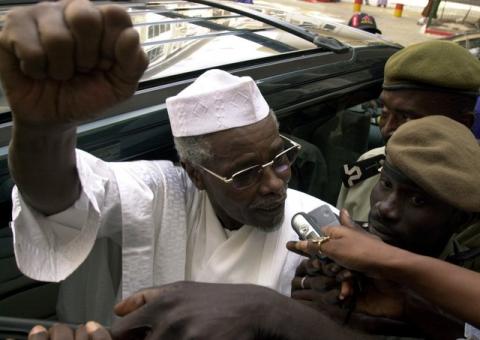Advertisement
Chad's ex-leader Habre, Cold War-era ally of West, gets life in prison for atrocities
DAKAR (Reuters) - Former Chad president Hissene Habre, an ally of the West during the Cold War, was convicted on Monday of war crimes and crimes against humanity for ordering the killing and torture of thousands of political opponents during his eight-year rule.
The verdict capped a 16-year battle by victims and rights campaigners to bring the former strongman to justice in Senegal, where he fled after being ousted in a 1990 coup.
Habre, 73, was sentenced to life in prison by the Special African Chamber (CAE), a tribunal created in 2013 by Senegal and the African Union. He was also convicted of rape.
Dressed in white robes with dark sunglasses and a head scarf covering most of his face, Habre was defiant after his conviction and sentence were announced, raising his arms and shouting to his supporters as he was led from the courtroom.
Many, including some of his victims present in the courtroom, cheered in celebration.
"After years of struggle and many setbacks on the way to justice, this verdict is as historic as it was hard-won," said U.N. High Commissioner for Human Rights Zeid Ra'ad Al Hussein. "In a world scarred by a constant stream of atrocities, the ramifications of this verdict are global."
Habre has refused to recognize the CAE's jurisdiction and at times had to be forced to appear in court, delaying proceedings.
The tribunal is supported by the African Union but is part of Senegal's justice system, making it the first time in modern history that one country's domestic courts have prosecuted the former leader of another country on rights charges. Other such cases have been tried by international tribunals.
The case centered on whether Habre, who was feted at the White House in 1987 by President Ronald Reagan after expelling Libyan forces from Chad, ordered the large-scale assassination and torture of political opponents and ethnic rivals.
U.S. Secretary of State John Kerry called Monday's verdict "a landmark in the global fight against impunity" in a statement that alluded to Washington's Cold War-era support for Habre.
"As a country committed to the respect for human rights and the pursuit of justice, this is also an opportunity for the United States to reflect on, and learn from, our own connection with past events in Chad," he said.
"NEVER AGAIN"
A 1992 Chadian Truth Commission accused Habre's government of up to 40,000 political murders as well as systematic torture, mostly by his intelligence police, the Documentation and Security Directorate (DDS).
An investigation by Human Rights Watch in 2001 unearthed thousands of documents in the abandoned DDS headquarters updating Habre on the status of detainees. During the trial, a court handwriting expert confirmed margin notes on one document to be Habre's.
During the trial, some of his victims testified in Habre's presence, recounting the acts of torture to which they were submitted.
Presiding Judge Gustave Kam recounted how Habre was directly involved in interrogations and torture, sometimes inflicting the abuse himself or ordering it by phone or walkie talkie.
"The verdict sends a powerful message that the days when tyrants could brutalize their people, pillage their treasury and escape abroad to a life of luxury are coming to an end," said Reed Brody, a Human Rights Watch researcher who helped to investigate the crimes.
Habre's lawyers now have two weeks to launch an appeal.
The trial was seen as highlighting African countries' ability to hold their own trials at a time of growing criticism of the International Criminal Court (ICC) in The Hague, which many on the continent accuse of bias against Africans.
"We are proud that this trial took place on African soil. Never this type of terror again," said Clement Abaifouta, president of the Chadian Victims’ Association (AVCRP), whose aim was to bring Habre to justice.
(Writing by Edward McAllister; Editing by Joe Bavier and Gareth Jones)



















Add new comment